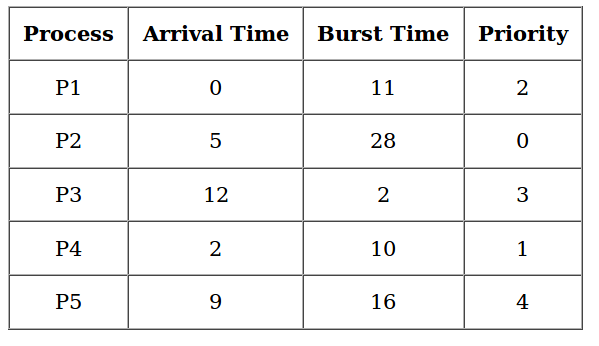先决条件 –优先调度程序 – 设置 1
优先级调度是一种非抢占式算法,是批处理系统中最常见的调度算法之一。如果两个进程具有相同的到达时间,则为每个进程分配最先到达时间(先到达时间少的进程),然后比较优先级(最高的进程在前)。此外,如果两个进程具有相同的优先级,则比较进程号(先少进程号)。在执行所有过程时重复此过程。
执行 –
- 首先输入进程的到达时间、突发时间和优先级。
- 第一个进程会调度到达时间最短的进程,如果两个或更多进程的到达时间最短,那么谁先调度谁的优先级高。
- 现在将根据流程的到达时间和优先级安排进一步的流程。 (这里我们假设优先级越低优先级越高)。如果两个进程优先级相同,则根据进程号进行排序。
注意:在问题中,他们会清楚地提到哪个号码的优先级更高,哪个号码的优先级更低。 - 一旦所有进程都到达,我们可以根据它们的优先级来安排它们。

甘特图 –

例子 –
Input :
process no-> 1 2 3 4 5
arrival time-> 0 1 3 2 4
burst time-> 3 6 1 2 4
priority-> 3 4 9 7 8
Output :
Process_no arrival_time Burst_time Complete_time Turn_Around_Time Wating_Time
1 0 3 3 3 0
2 1 6 9 8 2
3 3 1 16 13 12
4 2 2 11 9 7
5 4 4 15 11 7
Average Wating Time is : 5.6
Average Turn Around time is : 8.8 C++
// C++ implementation for Priority Scheduling with
//Different Arrival Time priority scheduling
/*1. sort the processes according to arrival time
2. if arrival time is same the acc to priority
3. apply fcfs
*/
#include
using namespace std;
#define totalprocess 5
// Making a struct to hold the given input
struct process
{
int at,bt,pr,pno;
};
process proc[50];
/*
Writing comparator function to sort according to priority if
arrival time is same
*/
bool comp(process a,process b)
{
if(a.at == b.at)
{
return a.pr Java
// Java implementation for Priority Scheduling with
//Different Arrival Time priority scheduling
import java.util.*;
/// Data Structure
class Process {
int at, bt, pri, pno;
Process(int pno, int at, int bt, int pri)
{
this.pno = pno;
this.pri = pri;
this.at = at;
this.bt = bt;
}
}
/// Gantt chart structure
class GChart {
// process number, start time, complete time,
// turn around time, waiting time
int pno, stime, ctime, wtime, ttime;
}
// user define comparative method (first arrival first serve,
// if arrival time same then heigh priority first)
class MyComparator implements Comparator {
public int compare(Object o1, Object o2)
{
Process p1 = (Process)o1;
Process p2 = (Process)o2;
if (p1.at < p2.at)
return (-1);
else if (p1.at == p2.at && p1.pri > p2.pri)
return (-1);
else
return (1);
}
}
// class to find Gantt chart
class FindGantChart {
void findGc(LinkedList queue)
{
// initial time = 0
int time = 0;
// priority Queue sort data according
// to arrival time or priority (ready queue)
TreeSet prique = new TreeSet(new MyComparator());
// link list for store processes data
LinkedList result = new LinkedList();
// process in ready queue from new state queue
while (queue.size() > 0)
prique.add((Process)queue.removeFirst());
Iterator it = prique.iterator();
// time set to according to first process
time = ((Process)prique.first()).at;
// scheduling process
while (it.hasNext()) {
// dispatcher dispatch the
// process ready to running state
Process obj = (Process)it.next();
GChart gc1 = new GChart();
gc1.pno = obj.pno;
gc1.stime = time;
time += obj.bt;
gc1.ctime = time;
gc1.ttime = gc1.ctime - obj.at;
gc1.wtime = gc1.ttime - obj.bt;
/// store the exxtreted process
result.add(gc1);
}
// create object of output class and call method
new ResultOutput(result);
}
}Python3
# Python3 implementation for Priority Scheduling with
# Different Arrival Time priority scheduling
"""1. sort the processes according to arrival time
2. if arrival time is same the acc to priority
3. apply fcfs """
totalprocess = 5
proc = []
for i in range(5):
l = []
for j in range(4):
l.append(0)
proc.append(l)
# Using FCFS Algorithm to find Waiting time
def get_wt_time( wt):
# declaring service array that stores
# cumulative burst time
service = [0] * 5
# Initialising initial elements
# of the arrays
service[0] = 0
wt[0] = 0
for i in range(1, totalprocess):
service[i] = proc[i - 1][1] + service[i - 1]
wt[i] = service[i] - proc[i][0] + 1
# If waiting time is negative,
# change it o zero
if(wt[i] < 0) :
wt[i] = 0
def get_tat_time(tat, wt):
# Filling turnaroundtime array
for i in range(totalprocess):
tat[i] = proc[i][1] + wt[i]
def findgc():
# Declare waiting time and
# turnaround time array
wt = [0] * 5
tat = [0] * 5
wavg = 0
tavg = 0
# Function call to find waiting time array
get_wt_time(wt)
# Function call to find turnaround time
get_tat_time(tat, wt)
stime = [0] * 5
ctime = [0] * 5
stime[0] = 1
ctime[0] = stime[0] + tat[0]
# calculating starting and ending time
for i in range(1, totalprocess):
stime[i] = ctime[i - 1]
ctime[i] = stime[i] + tat[i] - wt[i]
print("Process_no\tStart_time\tComplete_time",
"\tTurn_Around_Time\tWaiting_Time")
# display the process details
for i in range(totalprocess):
wavg += wt[i]
tavg += tat[i]
print(proc[i][3], "\t\t", stime[i],
"\t\t", end = " ")
print(ctime[i], "\t\t", tat[i], "\t\t\t", wt[i])
# display the average waiting time
# and average turn around time
print("Average waiting time is : ", end = " ")
print(wavg / totalprocess)
print("average turnaround time : " , end = " ")
print(tavg / totalprocess)
# Driver code
if __name__ =="__main__":
arrivaltime = [1, 2, 3, 4, 5]
bursttime = [3, 5, 1, 7, 4]
priority = [3, 4, 1, 7, 8]
for i in range(totalprocess):
proc[i][0] = arrivaltime[i]
proc[i][1] = bursttime[i]
proc[i][2] = priority[i]
proc[i][3] = i + 1
# Using inbuilt sort function
proc = sorted (proc, key = lambda x:x[2])
proc = sorted (proc)
# Calling function findgc for
# finding Gantt Chart
findgc()
# This code is contributed by
# Shubham Singh(SHUBHAMSINGH10)输出:
Process_no Start_time Complete_time Turn_Around_Time Waiting_Time
1 1 4 3 0
2 5 10 8 3
3 4 5 2 1
4 10 17 13 6
5 17 21 16 12
Average Waiting Time is : 4.4
Average Turn Around time is : 8.4时间复杂度: O(N * logN),其中 N 是进程总数。
辅助空间: O(N)